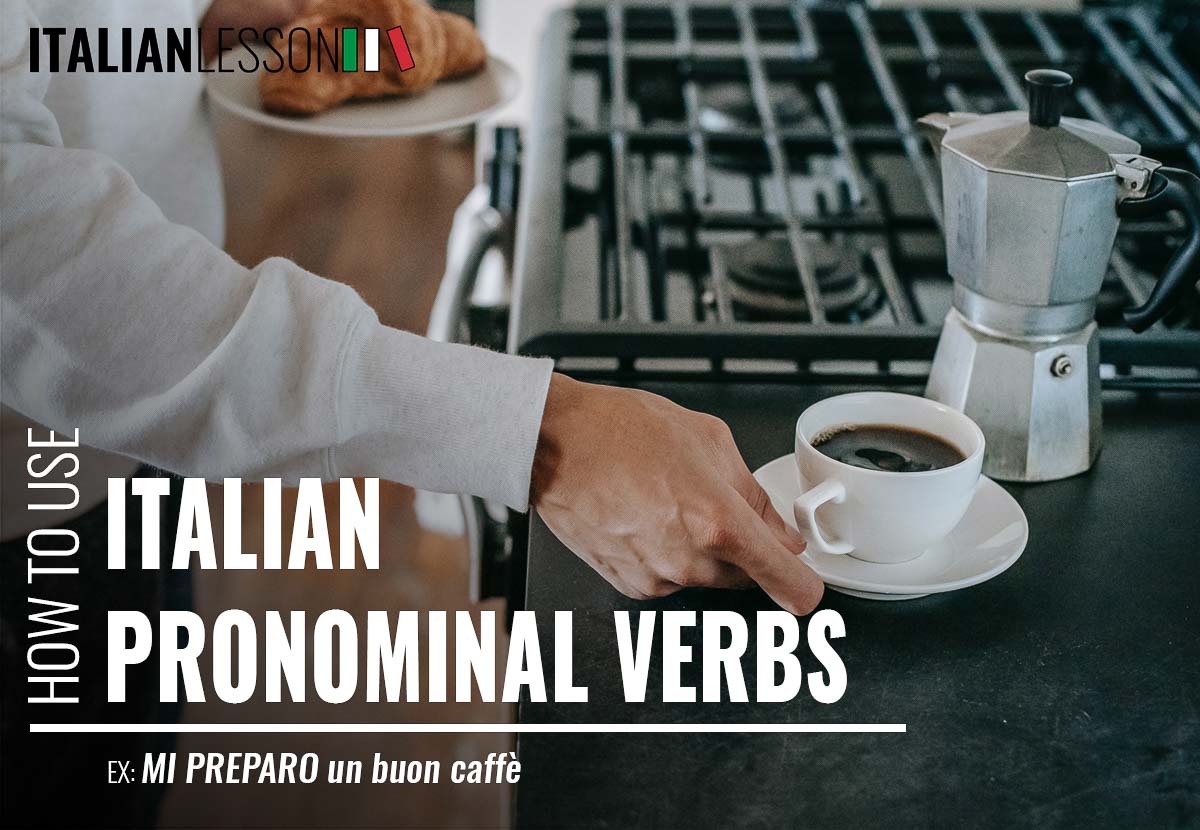
Italian pronominal verbs | Pronominal verbs are verbs that have a pronoun in the infinitive form.
If you clicked on this article it is because you are delving deeper and deeper into Italian grammar.
Each topic is a starting point for expanding your Italian vocabulary and also for improving the Italian pronunciation of all the new elements you encounter in each “lesson”.
First of all, let me tell you today’s topic: Italian pronominal verbs.
Don’t worry, I will try to provide a simple and comprehensive explanation!
Let’s see what Italian pronominal verbs are and how to use them with some examples:
- Mi vedo un documentario / I watch a documentary (direct object)
- Mi reco al bar / I go to the bar (indirect object – complement of motion to place)
Plus, it is important to know the Italian conjugation of pronominal verbs, for this reason we will now combine 3 verbs with an appropriate translation in English: ALZARSI – PREPARARSI – SBAGLIARSI
| ALZARSI | TO GET UP |
| Io mi alzo Tu ti alzi Egli / Ella – Lui / Lei si alza Noi ci alziamo Voi vi alzate Essi / Esse – Loro si alzano | I get up You get up He / She / It gets up We get up You get up They get up |
| PREPARARSI | TO PREPARE |
| Io mi preparo Tu ti prepari Egli / Ella – Lui / Lei si prepara Noi ci prepariamo Voi vi preparate Essi / Esse – Loro si preparano | I prepare You prepare He / She / It prepares We prepare You prepare They prepare |
| SBAGLIARSI | TO BE WRONG |
| Io mi sbaglio Tu ti sbagli Egli / Ella – Lui / Lei si sbaglia Noi ci sbagliamo Voi vi sbagliate Essi / Esse – Loro si sbagliano | I am wrong You are wrong He / She / It is wrong We are wrong You are wrong They are wrong |
In particular, there are also some syntactic constructions in which the pronominal verb does not refer to the subject, as in these cases:
- CURARE
Il pediatra cura i bambini / The pediatrician treats the children (transitive)
- CURARSI
Mi curo il raffreddore con tisane allo zenzero / I cure my cold with ginger tea (intransitive)
What about compound tenses? In this case, Italian pronominal verbs in compound tenses use the verb to be as auxiliary: e.g.
Mi sono pentita di essermi fidata di te / I regret trusting you.
Pay attention! Pronominal particles do not always indicate an object:
Mi faccio una passeggiata / I take a walk
Mi mangio una mela / I eat an apple
Plus, pronominal particles are truly multifaceted!
They can also reinforce a concept, as in these cases:
Non me ne importa / I don’t care
Me ne vado / I’m leaving
Me ne dispiace / I’m sorry
Here is the links to learn more about Italian pronouns
https://italianlesson.it/how-to/italian-pronouns/
Ok, enough for today!
Remember to read a lot, to consult the vocabulary for every word you do not know and to listen to the pronunciation of these words so as to add more and more new vocabulary during the study!
In addition, on Youtube you can watch many videos in Italian, for example movie trailers, songs with lyrics, so you can have fun but learn at the same time!
Have fun with the pronunciation exercises and don’t forget to practice! There are so many things to know and each topic is important in helping you to continue studying this fantastic language!
